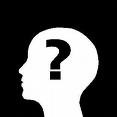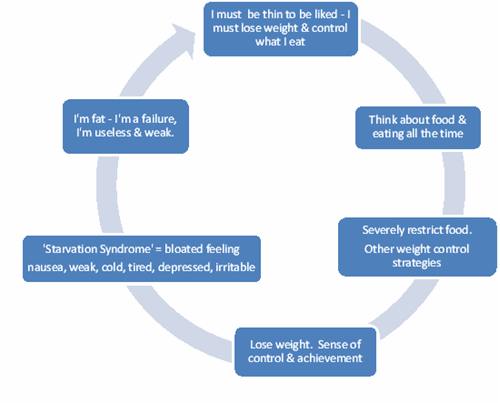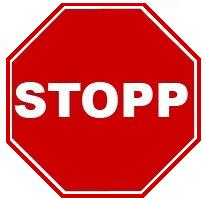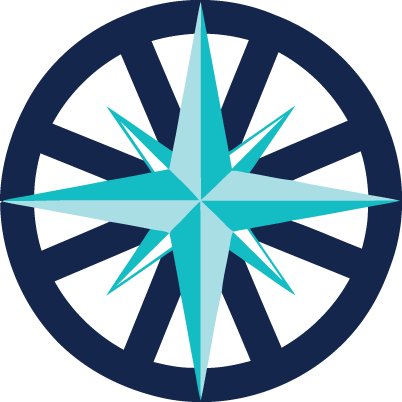Anorexia Self Help
Self help guide for Anorexia, using effective CBT strategies. Make sense of your anorexia, then learn how to make positive changes
Anorexia Self Help - this page as PDF
Anorexia often starts in the teenage years, and most commonly affects girls, but it can affect both sexes, and all ages. There is often an underlying sense of low worth or self-esteem. The anorexia may be triggered by stressful life events, or simply a pressure to be thin and physically attractive. What can start as a diet regime to lose weight, can gradually become much more sinister and harmful.
Common thoughts, physical symptoms, emotions and behaviours are:
Thoughts
-
Negative self beliefs: Judge self by what I eat and look like, and my ability to control what I eat and look like.
-
Strict rules about controlling food, shape and weight
-
Focus of attention is taken up with food and eating
-
What I should or shouldn't eat
-
Self-critical thoughts when don't keep to rules: I failed, I'm useless and weak, I'm worthless
-
I need to be thin to be in control
-
Others are trying to make me fat
-
I'll fall apart if I don't control myself
-
If I'm not perfect, then I'm a complete failure
Physical Symptoms
-
Extreme weight loss
-
Nausea & bloating after eating
-
Feeling cold
-
Dry and flaky skin
-
Difficulty concentrating
-
Brittle nails and hair
-
Dehydration
-
Tired, weak, run-down
-
Long term: kidney damage, osteoporosis, lack of menstrual periods, cardiac failure
Emotions
-
Guilt
Behaviours
-
Controlling food intake: when, what, how much, who with etc
-
Missing meals

-
Hiding food or disguising what eating or not eating
-
Cutting food into tiny pieces
-
Refusing to eat with others
-
Avoiding certain foods (e.g. high calorie)
-
Vomiting
-
Using laxatives, diet or diuretic pills
-
Exercising too much
-
Weighing self frequently
-
Checking reflection in mirror
-
Reading, watching, joining in with internet websites which promote anorexia and unhealthy "thin and beautiful" lifestyles
-
Isolating, not socialising, avoiding social events (especially those that involve meals)
Vicious Cycle Of Anorexia - what keeps it going?

Before starting any self-help plan, particularly one that includes a diet and exercise plan - see your GP (or other appropriate health professional).
Doing Things Differently
-
Seek help - others will support you (and anorexia is potentially life-threatening)
-
Keep a food diary PDF to assess your current intake, then...
-
Create a simple menu plan with a suitable health professional - and stick to it! E.g. 3 meals and 3 snacks per day
-
Drink 6 - 8 glasses of water each day
-
Weigh yourself weekly - no more often
-
Exercise contract - again, agreed with a suitable health professional. Stick to it!

-
Use medication appropriately and only as prescribed - avoid laxatives, diet pills, diuretics
-
Avoid diet and celebrity magazines, and internet websites, which promote anorexia and unhealthy "thin & beautiful" lifestyles
-
Don't rush food - sit down and eat slowly, enjoying the taste. Eat mindfully
-
Eat with trusted family and friends rather than isolate yourself
Thinking Differently
STOPP! Pause, take a breath, don't react automatically
Understand the links between thoughts, feelings and behaviours
Use Wise Mind - replacing "emotion mind" with "anorexia mind"
Ask yourself:
-
Is this Fact Or Opinion?
-
What advice would I give a friend in this situation?
-
Am I putting more pressure on myself, setting up expectations of myself that are almost impossible? What would be more realistic?
-
Just because I feel bad, doesn't mean things really are bad.
-
What do I want or need from this person or situation? What do they want or need from me? Is there a compromise?
-
Am I misinterpreting that bloated feeling as "fatness" when it's most likely to be the natural physical reaction to not eating enough?
-
What would be the consequences of responding the way I usually do?
-
Is there another way of dealing with this? What would be the most helpful and effective action to take? (for me, for the situation, for the other person)

-
Am I exaggerating the good aspects of others, and putting myself down? Or am I exaggerating the negative and minimising the positives?
-
How would someone else see it?
-
What's the bigger picture? What's the Helicopter View?
When Dealing With Distressing Situations:
-
STOPP! Pause, take a breath
-
Focus your attention fully on another activity - Mindful Activity
-
Do something different (to what you normally do)
-
Relaxation techniques - try lots and find one that works for you
-
Put on some music - sing and dance along, or just listen attentively (use music that is likely to help you feel your desired emotion - avoid sad songs if you're depressed)
-
Meditation or Prayer
-
Help others
-
Be with others - contact a friend, visit family
-
Talk to someone
-
Grounding Techniques - look around you, what do you see, hear, smell, sense? Hold a comforting object.
-
Engage in a hobby or other interest - if you don't have one, find one! What have you enjoyed in the past? What have you sometimes thought about doing but not got around to?
-
Write down your thoughts and feelings - get them out of your head
-
Just take one step at a time - don't plan too far ahead
-
Pamper yourself - do something you really enjoy, or do something relaxing
-
Positive Self-talk - encourage yourself, tell yourself: I can do this, I am strong and capable - find a positive coping statement or affirmation that works for you (even if you don't believe it at first!). Write it down and memorise it for when you need it.
-
Do something creative - make a box of items that remind you to use the techniques that help, or put photos on paper, or write and decorate a list
-
Tell yourself: "This will pass, it's only temporary". "I've got through this before, I can do it now". When we're going through a tunnel and become fearful of being trapped, there's no point in stopping - we just have to carry on in order to reach the end of the tunnel. That light is there, and waiting!
-
Find an alternative and healthier way of dealing with distress (PDF)
This Anorexia webpage written with the valuable help and personal insight of Kate Le Page
Anorexia Self Help - this page as PDF
Learn effective skills online - The Decider Skills for Self Help online course.
Self Help Books
Overcoming Anorexia
The Anorexia Workbook: How to Accept Yourself, Heal Your Suffering, and Reclaim Your Life (New Harbinger Self-Help Workbook)
An Apple a Day A Memoir of Love and Recovery from Anorexia




















